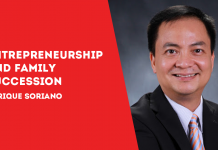
BY PROF. ENRIQUE SORIANO
IN THE world of family businesses, there is always a dark side that time and again erupts into a scandal and spills into the front pages of national dailies. More like a soap opera but with far more damning revelations that unceasingly never stops.
On the one hand, we have written countless stories of successful families that are able to transition to the next generation but on the other hand, history constantly reminds us that we have much to learn from multitudes of failures and conflicts over documented successes.
It is not because we gloat at the sight of family members hurting each other but it is simply to challenge family advisors like me to dissect the intensity of the conflict and profoundly understand how the disruptive event started, who drew first blood or what circumstances triggered it and what actions (or inactions) did the parents/business owners do to further “fuel the fire.”
Was it patriarchal (or matriarchal) control, or was it sibling rivalry that became more intense when the children joined the business?
Was it the lack of clarity in roles and decision making or was the conflict caused by in-laws or blended families (parents remarried or bearing children out of wedlock)?
Or maybe due to the perceived unfairness brought about by business owners acting more like parents effectively cuddling or even condoning the bad behaviors of some family members at the expense of other members that are ably and dutifully discharging their roles.
As authors Grant Gordon and Nigel Nicholson in their book Family Wars correctly pointed out, “it is true that the elements that make family businesses spontaneous, informal and passionate can easily tip over into something much more unpleasant and chaotic.
Feistiness turns into fearfulness. Love turns into possession. The family dynamic is a potent force and it needs control and constraint to achieve its best and those controls have to come from within the hearts and minds of the members.”
It is therefore important to pay attention to the informal nature and complexities of family issues that are intertwined with the business. The founder, their spouse, their children, and grandchildren will continue to be relatives after the transfer of the business.
Add the strong emotional experiences family members have shared (both positive and negative), with the usual presence of grandchildren, and it quickly becomes apparent that in most family enterprises, the relational issues far outweigh financial or business factors. And if left unchecked, it can be one hell of a roller coaster ride.
Acknowledging the consequences of this preventable but tumultuous event years before it happens is one major step towards a founder pursuing legacy building measures.
We do acknowledge that every founder invariably has his or her own set of beliefs especially in the way he or she runs the business. But it is also important that the willingness of these owners to share power, be biased toward professionalizing the organization and gradually plan for succession is often a decisive factor in determining whether the business survives or fails. The mortality statistics make bleak reading. In a study conducted by my firm (Wong + Bernstein Family Advisory) a few years ago, we concluded that only a third of family businesses in Asia will make it to the next generation.
What we also found out in our internal client review and assessment was also unfortunate…that the firm has been recognized as the go to advisory firm to mediate a disruptive conflict.
Of course, we are delighted and thankful for the recognition but we would have preferred that Asian family firms seek us out for governance and not necessarily to broker peace deals among warring families.
To quote Harry Levinson, “the most successful executives are often men who have built their own companies. Ironically their very success frequently brings to them and members of their families personal problems of an intensity rarely encountered by professional managers. And these problems make family businesses probably the most difficult to operate.”/PN





